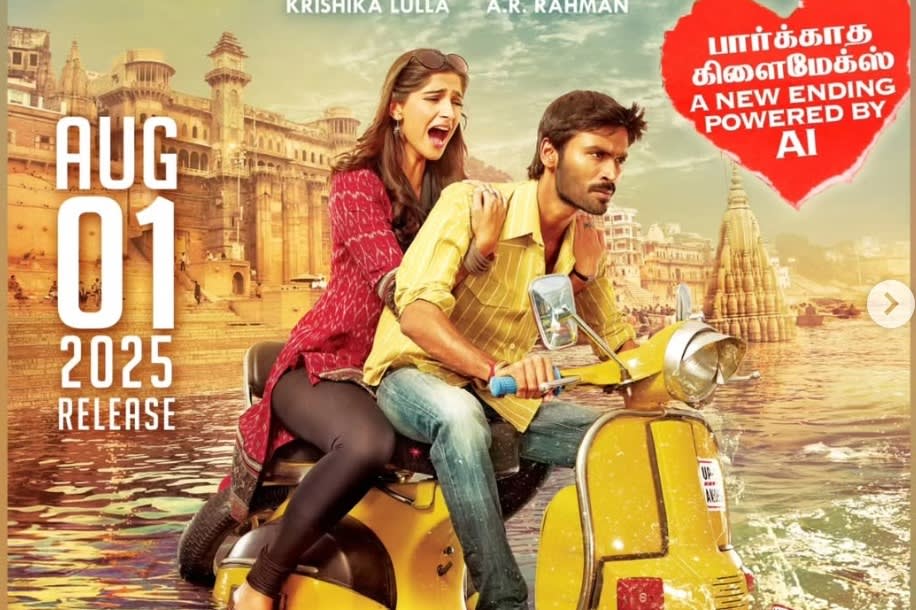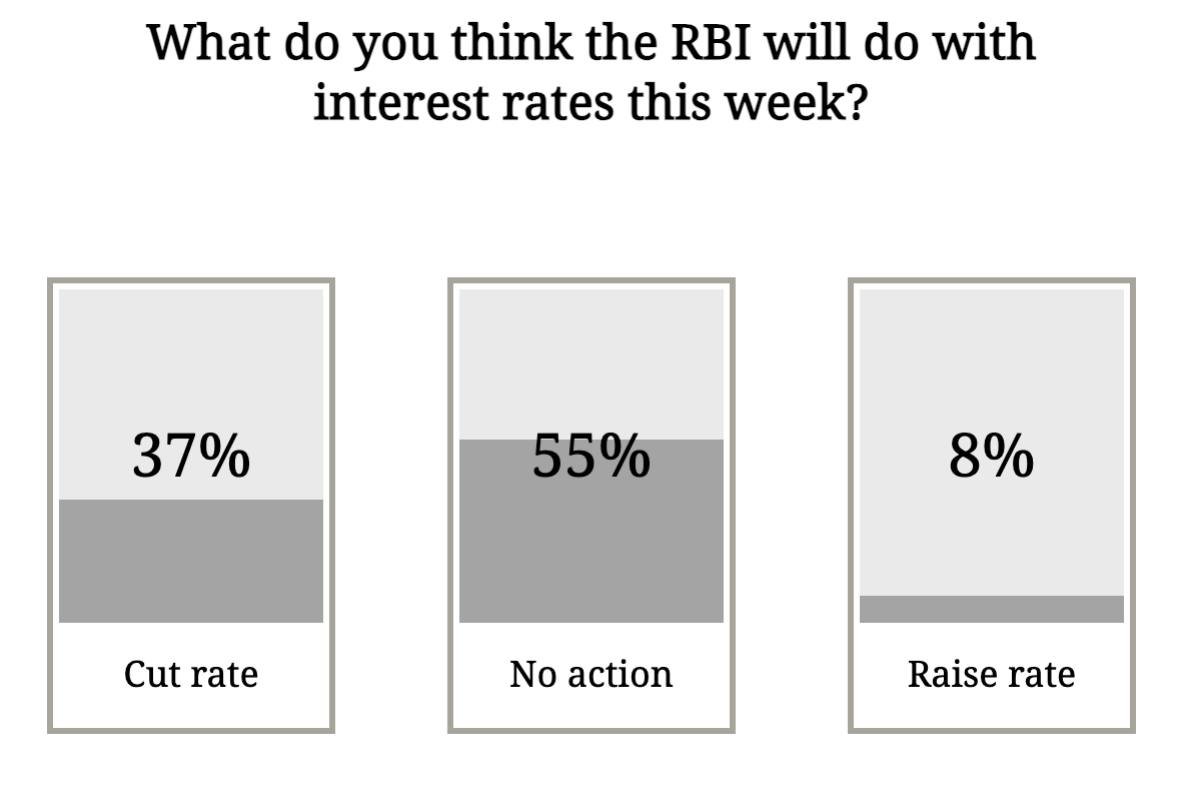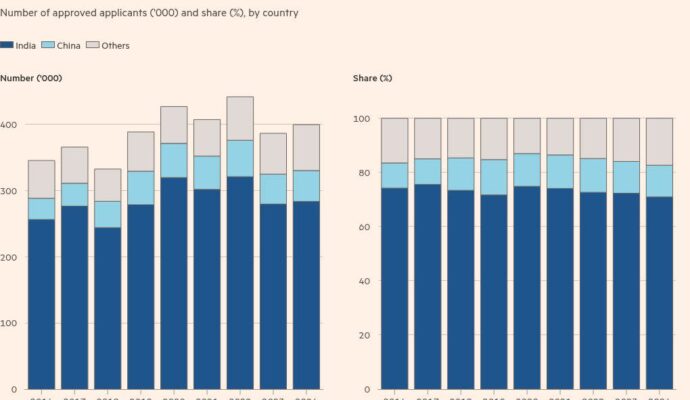Another week, another rollercoaster ride. The Trump administration has announced additional 25 per cent tariffs to punish India for buying Russian oil, due to take effect on August 27. Officials from both countries were supposed to meet two days before that, but media reports suggest talks could now be cancelled. It is still possible that a promise to cut back on Russian fuel could avert the new levies.
Yesterday, Prime Minister Narendra Modi said he would “never compromise” on the interests of farmers, livestock owners and fishermen, a signal to Washington that India will not let in American farm and dairy products. The battle lines are clearly drawn.
Weak currency
The Indian rupee has weakened substantially, despite the Reserve Bank of India’s active interventions over the past few months. Shortly after the central bank’s decision to leave key interest rates unchanged on Wednesday, the currency slipped to Rs87.88 against the dollar — nearly hitting the record low of Rs87.95 set in February.
While some of the rupee’s weakness can be blamed on the uncertainty caused by Trump’s actions, there are other factors at play. Foreign direct investment (FDI) into India has slowed to a trickle, resulting in a corresponding drop in demand for the rupee. The most recent RBI data shows FDI for May was $35mn, a decline of 98 per cent year on year and 99 per cent from the previous month. A large part of this was due to repatriations, as investments were pulled out of India. Global institutional investors have also withdrawn nearly $10bn from India’s stock markets since the start of the year. With poor consumption growth, low capital expenditure and low credit offtake in the economy, it seems unlikely the trend will reverse. The rupee will not get much support from foreign inflows in the near to medium term.
One of the more significant uses of US dollars for the Indian government is paying for the country’s 230mn tonnes of crude oil imports, and a weaker rupee means these imports will be more expensive. India is facing Trump’s wrath over its reliance on cheaper Russian fuel. If it has to stop buying from Moscow and look to other countries, New Delhi could be forced to pay up to $7bn more annually, analysts estimate. The depreciating rupee would add to the hefty bill, which was $132.4bn last year.
Trump’s threats have generated quite a bit of commentary on the need for India to have strategic autonomy, and focus on reforms in the domestic markets by cutting red tape and bureaucratic delays. All that is very well in theory. On a practical level, we are already seeing the real effects of Trump’s use of trade as an economic weapon. The disruption to India’s macroeconomic fundamentals because of the impact on the currency will certainly be high in the next few quarters.
Do you think India should now focus inward? Hit reply or email me at indiabrief@ft.com
Recommended stories
Donald Trump and Vladimir Putin plan to meet in the coming days.
Trump has threatened a 100 per cent tariff on chips, with a carve-out for Apple.
BCG consultants modelled relocating Gazans to Somalia.
Berkshire shares have tumbled as Warren Buffett prepares to step down. Here’s my colleague Rob Armstrong’s take.
Tesla’s UK sales dropped 60 per cent as BYD surges.
HTSI’s first drive of the Temerario, Lamborghini’s latest supercar.
Plot twist

OK, now to something light(er). Last Friday, film production company Eros International re-released its 2013 hit Raanjhanaa in theatres. Re-releasing older films has been a Bollywood tactic for several months now, but Raanjhanaa’s recent airing was slightly different: the producers used artificial intelligence to create a new ending for the film.
(Spoiler alert: stop reading if you have not watched the original and plan to.) In the original, the hero dies at the end of the film, a plot twist that was divisive at the time since Indian audiences largely prefer happy endings. So, when it came to releasing the movie this year, the producers used AI to give that segment of the audience what they wanted — they let the hero live.
The twist in this tale has left the director and the lead actor of the film disappointed. Actor Dhanush took to social media earlier this week to protest about the new ending, saying it stripped the “soul of the film” and called for stricter regulation against such practices. Aanand L Rai, who directed the film, was also reportedly flummoxed by this decision. When I reached out, Eros International chief executive Pradeep Dwivedi called this a “creative reinterpretation”, which they were allowed to do as the exclusive copyright holder.
I am pretty sure this will be the first of many such re-releases, and to be honest, I think it makes things interesting. I am not alone; Dwivedi says the audience response to the new ending has been “overwhelmingly positive”. There are many ways to tell a story and if there is an audience for it, why not explore? (Caveat — I am not much of a movie-goer.)
But for actors and directors, this will mean protracted negotiations at the time of signing up. An AI-alteration clause will have to be inserted in contracts in order to make sure that they retain artistic control. It’s going to be a difficult one, and I am sure studios will fight hard to retain their control. In all the talk about AI taking over jobs, I don’t think we paid enough attention to the prospects of movie stars. It is not inconceivable that many future movie stars themselves will be artificial.
Would you watch movies with AI-rendered plot twists? Hit reply or email me at indiabrief@ft.com
Go figure
Rescue operations continue in Uttarakhand, where heavy rains and flash floods led to a massive landslide. The weather department has sounded warnings for more rainfall in the region.
5
Death toll
190
Rescued
Read, hear, watch
I have had a busy week and haven’t had time to read, watch or reply to your emails (I hope my bosses are reading this). I did, however, try to switch my commute back to the metro (instead of driving) and listened to two great podcast episodes. My first recommendation is this episode of Death, Sex & Money, in which The New Yorker writer Evan Osnos discusses his book about the super-rich, The Haves and the Have-Yachts: Dispatches on the Ultrarich. For me the most important takeaway was that no amount of money seems to buy contentment.
My second recommendation is Ezra Klein’s conversation with Salman Rushdie about his book, The Knife. The memoir recounts how the author was stabbed by an Islamic fundamentalist in 2022, and his subsequent recovery from his injuries. The conversation is insightful and poignant, which, in my view, the book failed to be.
Buzzer round
Gianni Infantino is president of world football’s regulatory body, Fifa. What are Swiss politicians hoping to enlist him for now?
Send your answer to indiabrief@ft.com and check Tuesday’s newsletter to see if you were the first one to get it right.
Quick answer
On Tuesday, we asked for your predictions about RBI’s rate actions. More than half of you got it right.

Thank you for reading. India Business Briefing is edited by Tee Zhuo. Please send feedback, suggestions (and gossip) to indiabrief@ft.com.

